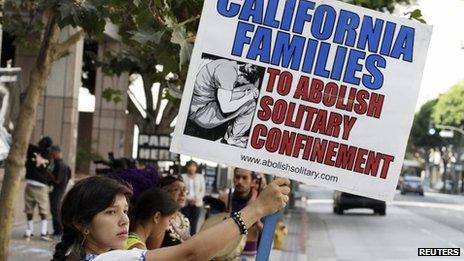California to force-feed hunger-striking prisoners
- Published

Supporters of the hunger strikers' campaign say long-term solitary confinement amounts to torture
A district court judge in California has given state authorities permission to force-feed dozens of prisoners who have been on hunger strike for more than six weeks.
Judge Thelton Henderson said some of the inmates who were near death could be fed, despite some signing requests not to be revived.
They are protesting at the practice of holding violent prisoners in isolation, sometimes for more than a decade.
Nearly 130 inmates are refusing meals.
Almost 30,000 prisoners out of a total of 133,000 in the state took part at the beginning of the hunger strike.
Prior to this ruling, California policy prohibited force-feeding of inmates if they had signed legally binding "do not resuscitate" (DNR) requests.
Gangs' pact
Prison officials were only allowed to seek permission to force-feed inmates on a case-by-case basis.
Now they have received blanket permission to do so if hunger strikers are near death or if DNR requests were signed just before or during a hunger strike.
This follows concerns expressed by authorities that some inmates were coerced into joining the latest action, which is now in its seventh week.
Four California prisons hold about 3,600 gang leaders and violent inmates in solitary "secure housing units" - some for many years.
Four leaders of rival white supremacist, black and enemy Latino gangs joined forces to promote the hunger strike in a bid to put an end to the use of the units, the Associated Press news agency reports.
Inmate advocates insist that force-feeding violates international law because it is non-consensual.
Lawyer Carol Strickman said she believed suggestions that inmates had been coerced were exaggerated.
The state should not ignore inmates' wishes in such matters of life and death, Ms Strickman told Reuters news agency.
"As much as I don't want to see anybody die, some people were choosing to sign those requests and some were not."
The hunger strike is the latest difficulty to hit the Californian prison system - which is under federal court order to reduce prison numbers by the end of the year in order to improve conditions, with the possible early release of 10,000 inmates.
- Published11 July 2013
- Published16 August 2011